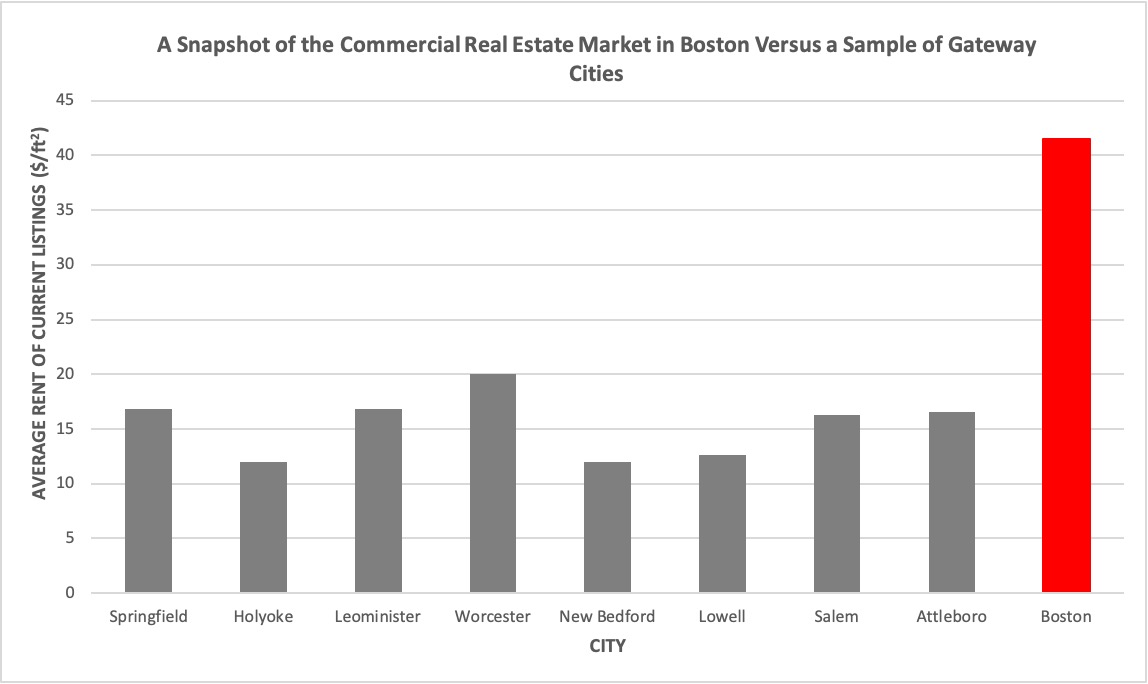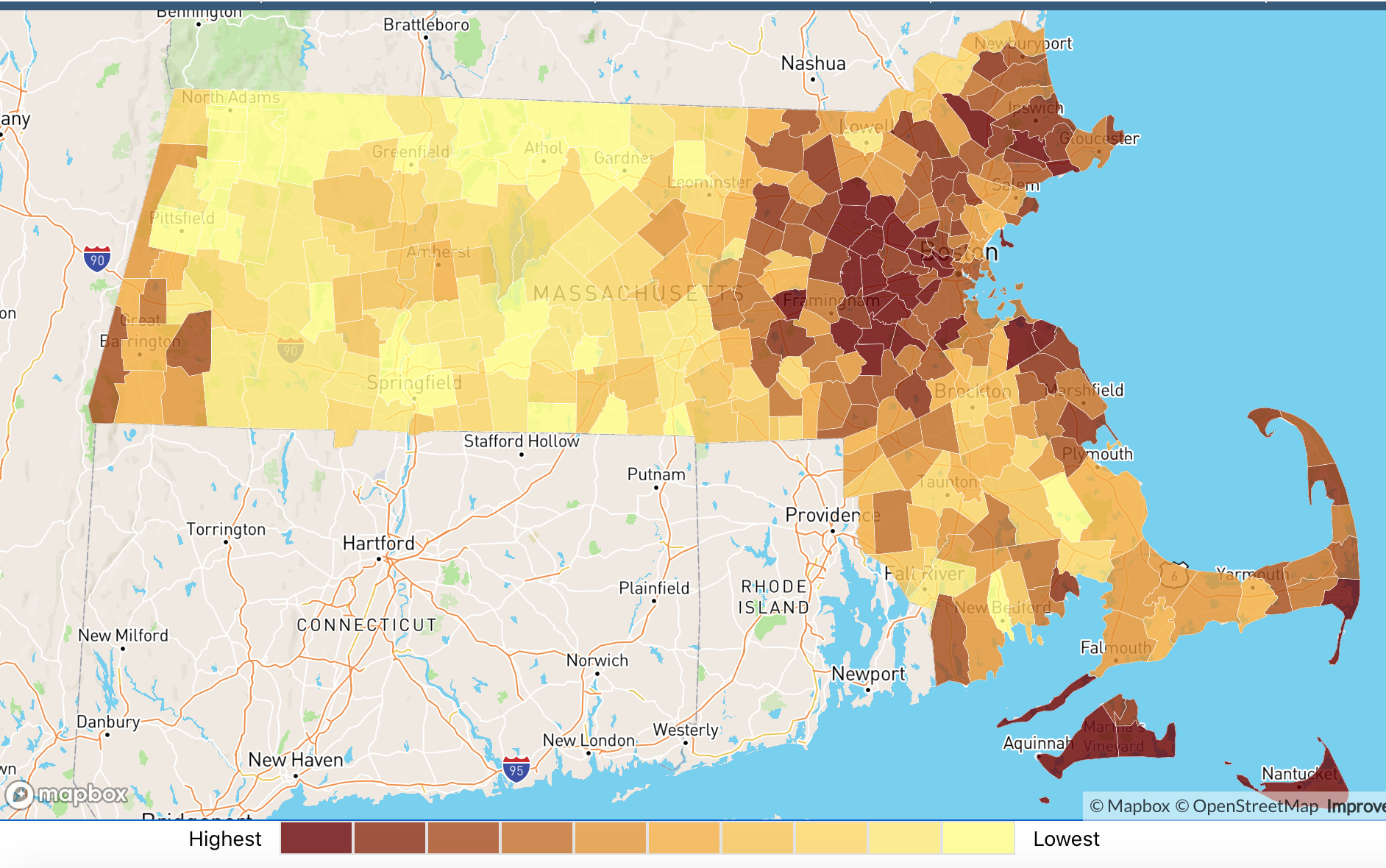This article is the first in a three-part series discussing pandemic recovery strategies with the potential to support inclusive, long-term economic development in Gateway Cities.
The coronavirus pandemic has entirely transformed the way that many people work. Downtown Boston office towers have been mostly vacant since March. Hundreds of thousands of white-collar workers who used to spend hours each day commuting to and from Boston and other job centers have instead been holed up in their home offices. Workers are spending more time in what were traditionally bedroom communities, resulting in an increase in pedestrian activity across almost every city and town in the Commonwealth, as seen in Figure 1.
Although telework was initially thought of as a temporary safety measure, white-collar workers will likely make telework a permanent part of their work weeks, leaving office parks and towers underused in the foreseeable future. Employers and workers alike are cautious about the safety of elevators and ventilation systems, especially in older buildings. Also, with schools limiting onsite learning, working parents need flexible schedules: a recent Washington Post-Schar School nationwide poll found that 50% of working parents said it would be “harder” or “impossible” to do their jobs if their kids were fully remote. [i] Given these concerns, many companies have postponed reopening plans or made onsite working optional. [ii]
However, research has shown that onsite collaboration is still essential for effectiveness and innovation. [iii] This dawning reality suggests that decentralizing larger workforces into satellite offices may be a necessary, long-term strategy for employers. Satellite offices reduce worker travel to office towers and large buildings while offering sites for in-person collaboration and office support. Satellite spaces can also form part of a business continuity plan: if one location must close due to a pandemic or other disruption, operations can continue from another office. [iv]
Gateway Cities are the perfect locations for satellite offices.
It’s no secret that many of our Gateway Cities have vacant commercial spaces. Satellite and co-working spaces can activate storefronts and empty floors, eliminating long commutes for workers who live nearby. Satellite offices can also bring new industries and businesses to Gateway City economies and increase pedestrian activity. With more workers in downtowns and business districts during the day, more tax revenues from commercial tenants and local sales boosts provide a two-fold windfall for catalyzing long-term economic development in Gateway Cities and other regional hubs.
For companies, Gateway City satellite offices save money during lean times, providing lower-cost facilities than sites in Boston or suburban office parks. Current rental listings reveal that the average rent per square foot for available office spaces in Gateway Cities is often over 50% less than the average in Boston, as seen in Figure 2. Satellite offices can allow facility managers to expand available square footage and customize ventilation systems with greater flexibility and lower costs than in some office towers. Gateway Cities also offer other underused benefits, such as Brockton’s fiber-optic internet trunk line, which is perfect for growing businesses that need reliable high-speed broadband. For businesses looking to adapt to COVID and other public health threats, economize, and expand their commercial real estate stock, Gateway Cities provide the perfect opportunity to work safely, efficiently, and effectively for long-term business resilience.

The push to decentralize large workforces into smaller cities is not new. Even before the pandemic, regions across the nation were moving towards remote work in live/work, transit-oriented communities. For example, Tulsa Remote, an initiative in Tulsa, Oklahoma, offered $10,000 for workers to relocate to the small, artistic city. This initiative and similar programs in Savannah, Georgia, Topeka, Kansas, and the state of Vermont have sought initiatives to bring workers and businesses with flexible work environments to less expensive and smaller metro areas with thriving, local culture. In Massachusetts, Gateway Cities present affordable alternatives for urban living (Figure 3).

Neighborhood Scout. (2020). Massachusetts real estate data
Similarly, in 2019 State Senator Eric Lesser, whose district includes Springfield and Chicopee, proposed a $1 million pilot program to provide up to $10,000 for workers to relocate to Western Massachusetts.[v] Analysts estimated that each relocated worker could generate $60,000 in benefits to the receiving community each year, plus attract new industries and workers with more disposable income to spend locally.[vi] Later that year, Governor Charlie Baker proposed a $2,000 per employee subsidy to be awarded to businesses which allow employees to work from home as a part of his multi-billions transportation bond bill.[vii] Questions about the scale of the plan’s impact convinced the State Legislature to table the initiative during discussions regarding the transportation bill.[viii]
Recommendations
MassINC recommends that business leaders and policymakers prioritize decentralizing Massachusetts’ workforce to address the state’s transportation struggles and geographic inequities, which this pandemic has magnified. It is imperative that policymakers include a targeted geographic approach to any incentive program aimed at decentralizing the workforce. For instance, an additional $1,000 per employee as an incentive for businesses choosing to relocate to a Gateway City or hire local residents would make it clear that the Commonwealth prioritizes investment in these regional hubs.
For nearly all Americans, the average workday looks nothing like it did in February 2020. The pandemic will continue to transform how we work, and Gateway Cities possess the promise and potential to lead that transformation. Given the ample vacant space, lower costs, and existing infrastructure in urban areas closer to suburban communities in regional cities, businesses and policymakers alike would be smart to redirect their attention and investments to Gateway Cities downtowns and station areas.
About the authors:
Maya Hamberg was a Tisch Summer 2020 Fellow Intern with MassINC. Claire Hutchinson is a fall 2020 Transformative Transit-Oriented Development Intern with MassINC. Dr. Tracy Corley is MassINC’s Transit-Oriented Development Fellow.
Sources:
[i] An Act Establishing the Western Massachusetts Remote Worker Relocation Incentive Program, S.208, 191st Cong. (2019). https://malegislature.gov/Bills/191/S208
[ii] Dr. Hans G. Despain. (Feb. 2019) Sen. Eric Lesser’s remote worker incentive program smart economic legislation. MassLive. https://www.masslive.com/opinion/2019/02/sen-eric-lessers-remote-worker-incentive-program-smart-economic-legislation-guest-viewpoint.html
[iii] Michael P. Norton, Matt Murphy, and Chris Lisinski. (March 6, 2020). Mass. House Approves $18 Billion for Transportation. The Enterprise. https://www.enterprisenews.com/news/20200306/mass-house-approves-18-billion-for-transportation
[iv] Michael J. Widmer. (Aug. 7, 2019). Telecommuting tax credit misses mark. CommonWealth Magazine. https://commonwealthmagazine.org/opinion/telecommuting-tax-credit-misses-mark/
[v] Joe Heim and Scott Clement. (Aug. 17, 2020). Working Parents Face Tough Decisions as Schools Reopen. Washington Post. https://www.washingtonpost.com/education/for-many-parents-the-return-to-work-depends-on-how-schools-reopen/2020/08/17/ff1a2682-de81-11ea-8051-d5f887d73381_story.html
[vi] Chris Cutter and Lauren Weber. (Aug. 23, 2020). Many Companies Had Planned to Reopen Offices After Labor Day. With Coronavirus Still Around, They’re Rethinking That. Wall Street Journal. https://www.wsj.com/articles/many-companies-planned-to-reopen-offices-after-labor-day-with-coronavirus-still-around-theyre-rethinking-that-11598175001
[vii] Kevin Roose. (March 10, 2020). Sorry, but Working From Home Is Overrated. New York Times. https://www.nytimes.com/2020/03/10/technology/working-from-home.html?searchResultPosition=2
[viii] Eric Anderson, President of Cummings Properties. (July 23, 2020). Interview.
